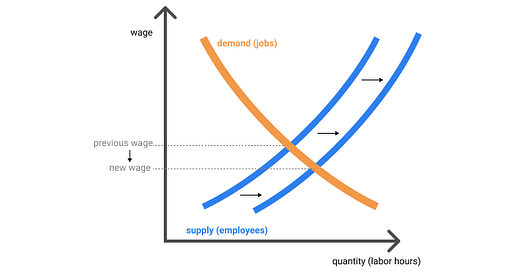Three reasons why tech salaries might stay the same despite a remote-first job market
The past year has led to many companies making the exciting decision to become remote-first. This decision is great for almost every party involved – the company benefits from a larger talent pool and reduced real-estate expenses, and employees benefit from flexible living arrangements and no commute.
But some people working in tech, especially in high-demand and high-paying fields (e.g., software engineering), are worried that the increase in talent pool means reduced compensation. The thinking behind this seems sound at first – neoclassical economics (the typical supply/demand curves you’ve probably seen before) says that if the supply (talent pool of employees) increases, and demand (number of job openings), then prices (salary) should decrease.
But there are glaring assumptions baked into this model that may change how the wage market behaves for tech jobs.
In this post, I’ll cover three reasons why tech salaries may stay the same despite a remote-first market.
1. Tech employees are highly differentiated and specialized.
The supply-demand curves you see assume perfect competition with an undifferentiated product. To map this to the wage market, this would mean that compensation for a particular role, for example, software engineer, would be fixed at some market-determined price, and there would be no difference between any two engineers. Obviously, this is not the case – tech jobs require highly specialized expertise even within the same job function. People get hired based on their management experience, leadership ability, prior roles, etc.
2. Sometimes, humans are irrational and altruistic.
The supply and demand model assumes that individuals are perfectly rational and always serving our narrow, economic self-interest. There’s no room for employees to take a pay cut to work for a non-profit or a company they’re passionate about, or for a manager to reward an employee for being loyal or caring, or for an employee to boycott working at companies that violate their ethical values. Thankfully, the world we live in has all such instances, and I think we’re much better off for it.
3. In the labor market, excess supply can exist without getting removed.
The neoclassical model assumes that supply and demand will intersect at the market-clearing, or equilibrium price, resulting in no excess supply. However, labor markets are not market-clearing, as evidenced by the existence of unemployment.

This implies that wages are not at their market-clearing price. One theorized reason for why this might occur is the efficiency wage hypothesis, which suggests that employers might pay more than the equilibrium wage to incentivize employees to work harder or reduce turnover when hiring costs are high. These scenarios are pretty common in tech roles, where wages are generally high and employment benefits/flexibility high to encourage productivity and discourage turnover.
Clearly, some invalid assumptions baked into the neoclassical economic model make it not great at describing the labor market in general, especially the tech labor market. So what’s the takeaway?
For starters, don’t worry. But for every argument that tech compensation will decrease due to increased supply, there’s an equally valid counterargument for why they will remain unchanged. Just sit back and enjoy the newfound flexibility and freedom you have at your disposal.
And if remote working isn’t for you, that’s totally fine. More tech companies are becoming remote – of that, there’s no doubt. But there are many companies still functioning in an in-person or a hybrid working model.
There’s really no telling what will happen in the long-term as we continue to participate in this global experiment of remote-first working. We just have to wait and see.




